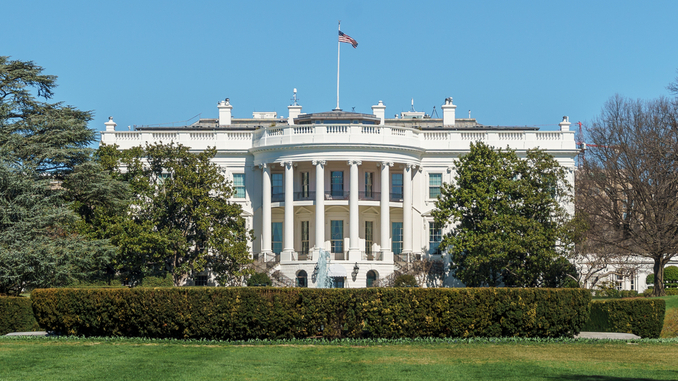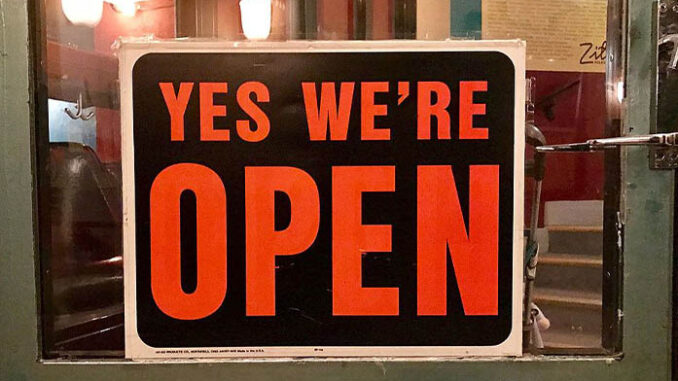
by Ethan Faverino | Oct 13, 2025 | Economy, News
By Ethan Faverino |
In a landmark victory for small businesses, Congress has made the 20% Small Business Tax Deduction, also known as Section 199A, a permanent qualified business deduction, ensuring long-term tax certainty for Main Street.
This critical provision allows small businesses to deduct up to 20% of their income, empowering mom-and-pop shops to grow, invest in their workforce, and play their part in giving back to the community.
The decision, signed into law by President Trump, averts a massive tax hike that would have impacted over 33 million small business owners nationwide at the end of 2025.
Making the Small Business Tax Deduction permanent changes the game for Main Street. The tax certainty provided by Congress ensures small businesses can thrive, hire more workers, and compete with larger corporations.
Since its introduction in 2017, the deduction has leveled the playing field for nine out of ten small businesses that file as pass-through entities. Recent NFIB surveys show growing confidence, with small business optimism reaching a five-month high.
The new tax law also includes pro-small business provisions, such as permanent extensions of the 2017 marginal tax rates, preventing up to a 4% tax hike for small businesses and employees.
Enhanced expense and depreciation rules under Section 179 and 168(k) enable business owners to confidently invest in growth, such as making large purchases. Additionally, increased reporting thresholds for IRS forms 1099-K, 1099-NEC, and 1099-MISC reduce paperwork burdens for businesses using platforms like Venmo or PayPal or engaging independent contractors.
The permanent estate tax exemption further supports owners looking to pass their businesses to the next generation or keep them locally owned.
National Federation of Independent Business (NFIB) State Director Chad Heinrich said, “An NFIB-commissioned study by EY found that the Small Business Tax Deduction will increase Arizona’s economic activity by more than $1.4 billion annually, resulting in the creation of 26,000 jobs each year. That means more, good-paying jobs for hardworking Arizonans.”
Ethan Faverino is a reporter for AZ Free News. You can send him news tips using this link.

by Jonathan Eberle | Oct 13, 2025 | Economy, News
By Jonathan Eberle |
A new study by Cinch Home Services has revealed that Arizona ranks among the top states in the nation for rising property values over the past decade, with home prices in the state increasing by more than 120% since 2015.
According to the analysis—which used Zillow’s Home Value Index to track average property prices between 2015 and 2025—Arizona ranks tenth overall, with an impressive 120.3% increase in average property value over the ten-year period. The state’s most dramatic growth occurred between 2021 and 2022, when home values surged 28.1% in a single year.
Arizona’s rise mirrors a broader national trend in which several western and southern states saw explosive growth during the early 2020s housing boom. The study found that many states experienced their steepest gains in the immediate aftermath of the COVID-19 pandemic when housing demand and home improvement projects spiked.
Leading the nation is Idaho, where property values jumped 156% over the decade—nearly doubling Arizona’s rate of growth. Utah followed with a 128.4% increase, while Washington, Florida, and Nevada rounded out the top five. Other high-growth states include Georgia, Tennessee, Maine, and New Hampshire, each seeing increases above 120%.
At the opposite end of the spectrum, Louisiana recorded the smallest increase in home values over the past ten years, at just 23.4%. A spokesperson for Cinch Home Services noted that the results highlight how local markets—not the national average—often drive housing trends.
“This study reveals something especially insightful: the housing market moves in local clusters as opposed to nationally,” the spokesperson said. “The biggest surprise was that between 2021 and 2022 saw the largest value jump across all states. One possible reason is that more people spent time at home in 2020 making improvements, then sold or reassessed their property’s value the following year.”
The spokesperson added that homeowners looking to boost their property’s worth should focus on “first impressions,” recommending improvements such as fresh landscaping, parking availability, or a new front door to enhance curb appeal.
Top 10 States for Property Value Growth (2015–2025)
- Idaho – 156%
- Utah – 128.4%
- Washington – 127.1%
- Florida – 125.3%
- Nevada – 124.4%
- Georgia – 122.5%
- Tennessee – 121.3%
- Maine – 121%
- New Hampshire – 120.7%
- Arizona – 120.3%
Jonathan Eberle is a reporter for AZ Free News. You can send him news tips using this link.

by Jonathan Eberle | Oct 11, 2025 | Economy, News
By Jonathan Eberle |
Arizona State Senator David Farnsworth, chairman of the Senate Appropriations and Transportation Committee, is doubling down on his commitment to improving Arizona’s transportation network, emphasizing both immediate roadway repairs and longer-term investments in next-generation infrastructure.
Farnsworth noted that Arizona’s rapid population growth is putting added strain on highways and local roads, making safety and upkeep a pressing priority. His plan, he said, reflects a blend of conservative fiscal principles and forward-looking technology, designed to strengthen connectivity across the state while preparing for future mobility needs.
A central component of that vision is Advanced Air Mobility (AAM) — a developing technology that uses electric aircraft, sometimes called “air taxis,” capable of vertical takeoff and landing for short-distance travel. Advocates say AAM could ease traffic congestion, expand emergency response capabilities, and connect rural communities more effectively. Farnsworth has supported legislative work on AAM since 2024, with an eye toward balancing innovation with public safety and regulatory clarity.
Other states are already moving toward implementation. For example, Archer Aviation is slated to provide official air taxi services for the 2028 Olympic Games in Los Angeles. Farnsworth said Arizona must be proactive in keeping pace with such developments.
The senator also pointed to autonomous vehicle testing in Arizona, particularly self-driving ground taxis, as a model for how advanced technology can be integrated into daily life. Together with AAM, he said, these tools represent the next chapter of transportation policy.
“The work begins by repairing what is broken, followed by building what comes next,” Farnsworth said. “Advanced Air Mobility and autonomous vehicles are no longer concepts of the future—they are active technologies with real-world applications. My job is to ensure Arizona stays ahead of the curve, not behind it.”
Farnsworth stressed that his focus remains on practical investments and collaboration with communities, technology leaders, and policymakers. His goal, he said, is a transportation system that is modernized, fiscally responsible, and designed to serve Arizona residents well into the future.
Jonathan Eberle is a reporter for AZ Free News. You can send him news tips using this link.

by Matthew Holloway | Oct 5, 2025 | Economy, News
By Matthew Holloway |
The White House Council of Economic Advisers (CEA) released a memo on Friday, detailing the state-level impacts of the government shutdown imposed by congressional Democrats and detailing the projected effects. The effects on Arizonans could be profound if the shutdown is not resolved quickly.
According to the Council of Economic Advisers, Arizona could face a decline of $296 million in Gross State Product each week or approximately $1.3 billion per month, and an increase in unemployment of about 1,000 people. Around 58,000 federal employees, or about 1.8 percent of Arizona’s workforce, could face furlough without pay.
For Arizona seniors and those who receive SSI disability benefits, they will be “likely delayed for those that(who) receive their Social Security benefits by check instead of direct deposit,” per the CEA. In Arizona, approximately 6,200 seniors currently receive their benefits by check.
If the shutdown extends beyond 30 days, the Supplemental Nutrition Assistance Program (SNAP) benefits of 887,000 total enrollees, including 344,000 children, could be impacted.
However, the council warned that families relying on WIC are at greater risk of disruption, saying, “Due to the government shutdown, federal funding for the Women, Infants, and Children (WIC) program stops immediately and becomes reliant on very limited local contingency funding. If the government shutdown is prolonged, those reserves are likely to run out by the end of the first week. In Arizona, there are approximately 153,000 WIC recipients who rely on the program for nutritional support for themselves and their children.. “
Seventy-six million dollars in small business loans, such as those made available to the victims of the Dragon Bravo and White Sage Fires, could also be delayed. Federal contract spending is expected to lose approximately $560 million should the shutdown persist for one month. Overall, the council warns that Arizona could lose $15 billion in GDP each week the government is shut down — a crisis that will ripple across every state.
Kush Desai, a White House Spokesperson, said in a statement emailed to AZ Free News, “President Trump and Republicans remain committed to ensuring families receive the support they deserve. Sadly, Democrats have chosen to shut down the federal government for political purposes…The Democrats’ shutdown is hurting the American people and letting millions of Americans’ livelihoods hang in the balance. Democrats need to vote on the clean, bipartisan funding extension.”
In a press release issued Thursday, Arizona Congressman Abe Hamadeh (R-AZ08) explained that Congressional Democrats are ultimately responsible for this shutdown. He stated, “This nonpartisan funding bill, passed 13 times under Biden, was rejected by Democrats solely due to their opposition to the new president. Their shutdown halts critical services like benefits for Veterans, military pay, and national security programs.”
Hamadeh added, “As the White House points out, the Democrats proposal would require Medicaid to pay more for emergency care provided to illegal aliens than it does for American patients who are disabled, elderly, or children.’ That is unacceptable. We can no longer afford to fund the results of the Biden Administration’s broken border scheme. Americans deserve a functioning government, and House Republicans delivered by voting to keep it open. Yet, Democrats voted to shut it down, prioritizing free healthcare for illegal immigrants over American citizens’ needs.”
Matthew Holloway is a senior reporter for AZ Free News. Follow him on X for his latest stories, or email tips to Matthew@azfreenews.com.

by Staff Reporter | Sep 29, 2025 | Economy, News
By Staff Reporter |
A series of new laws taking effect are anticipated to raise Arizona’s economic competitiveness.
The Arizona Chamber of Commerce & Industry (Arizona Chamber) highlighted six new laws as giving the state a beneficial boost in economic performance against other states.
These laws aim to make it feasible for international headquarters to build on-site workforce housing and support services (Senate Bill 1543), permit utilities to refinance infrastructure investments through securitization (House Bill 2679), allow Chase Field renovations without increasing taxes (House Bill 2704), make it feasible for advanced air mobility systems such as drone deliveries and air taxis (Senate Bill 1307), require utilities and public power entities to implement wildfire mitigation plans (House Bill 2201), and bars foreign entities from funding lawsuits while limiting outside funding to third-party litigation (Senate Bill 1215).
Dozens of states are working together to create a uniform approach to allowing advanced air mobility, along with the Federal Aviation Administration. Over 30 states are members of the Advanced Air Mobility Multistate Collaborative (AAMMC), formed in 2023 with eight to 10 member states. Arizona is member to the organization leading AAMMC, the National Association of State Aviation Officials.
In addition to raising awareness of the new laws it backs, the Arizona Chamber also releases public reports of failed bills it believed would harm the state’s economy. The chamber announced their 2025 report is forthcoming.
Arizona Chamber President and CEO Danny Seiden stated that the six featured laws would retain corporate interest in the state by implementing necessary reforms and new pathways to growth.
“As these laws take effect, Arizona employers can count on policies that reflect their priorities,” said Seiden. “From keeping vital economic drivers in Arizona, to passing commonsense energy reforms that will deliver long-term stability and affordability, to supporting global companies, these are the kinds of policies that keep Arizona competitive and attractive for investment.”
The legislature also passed other laws anticipated to boost the economy, some of which Governor Katie Hobbs also approved from the Republican-controlled legislature despite a historic veto record (nearly 200 bills this year, compared to her previous historic record of over 140 in 2023).
One such law promises to further protect Arizona from regulatory capture by monopoly-controlled utilities (House Bill 2518). The legislation prohibits Arizona Corporation Commission (ACC) members from accepting employment with the utilities under their regulation. Not all ACC members were pleased with the legislation, namely ACC Chairman Kevin Thompson.
Chair Thompson was the subject of an ethics claim filed by the Energy Policy Institute earlier this year, as first reported by the Arizona Republic. The institute alleged a conflict of interest regarding the relationship between Thompson’s consulting firm and utilities.
Another law will ensure construction crews may work in the early morning hours in the summers by prohibiting municipalities and counties from enacting or enforcing noise ordinances, rules, or regulations prohibiting general construction activities during certain summertime hours (Senate Bill 1182).
And another law requires municipalities to give affected businesses at least 60 days’ notice before voting on tax increases (House Bill 2119).
The legislature also chose to sunset the Low Income Housing Tax Credit program rather than renew. Critics of the program blame lax policies and procedures for the Department of Housing’s loss of around $2 million to a wire fraud scam in 2023.
AZ Free News is your #1 source for Arizona news and politics. You can send us news tips using this link.

by Jonathan Eberle | Sep 29, 2025 | Economy, News
By Jonathan Eberle |
Arizona added 700 nonfarm jobs in August, a modest increase that ranked the state 31st nationally in monthly job growth, according to a new analysis by the Common Sense Institute (CSI). Nationally, the U.S. economy gained 22,000 jobs, while 18 states recorded employment losses.
On an annual basis, Arizona showed stronger momentum, adding 41,400 jobs over the past year, a 1.29% gain that placed it 15th in the nation. However, CSI noted that the state has shed 15,100 jobs since April 2025, marking the second-highest nominal job loss in the country during that period and the fifth worst relative decline at 0.46%. Arizona’s unemployment rate remained at 4.1% in August, unchanged for six straight months. Labor force participation also held steady at 61.4%, below its pre-pandemic level of 62.2%.
Manufacturing led the way in August with 1,100 new jobs, a 0.6% increase that ranked Arizona third nationwide for monthly manufacturing growth. Despite the improvement, the sector remains down 1,100 jobs compared to last year. Mining and Logging posted the strongest year-over-year growth, adding 1,500 jobs, or 10.2%. By contrast, Leisure and Hospitality lost 0.6% of its workforce last month, while the Information sector continues to lag behind with a 2.7% year-over-year decline.
Average hourly wages in Arizona rose to $34.91, up 4.1% from August 2024. Adjusted for inflation, real wages increased 2.7% over the past year—outpacing the national average of 0.7%. Still, CSI’s report highlighted longer-term challenges: since April 2020, real wages in the state have fallen 4.3%.
Overall, the report points to a mixed picture for Arizona’s labor market: modest gains in key industries and wage growth, offset by lingering job losses since the spring and participation rates that remain below pre-pandemic levels.
Jonathan Eberle is a reporter for AZ Free News. You can send him news tips using this link.






